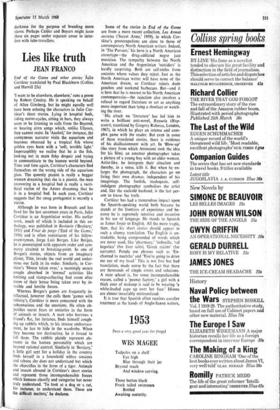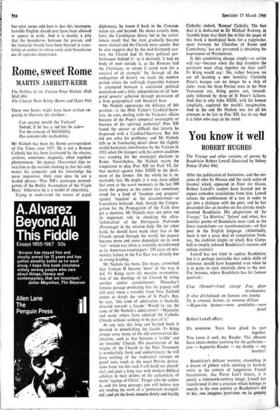Lies like truth
JEAN FRANCO
End of the Game and other stories Julio Cortazar translated by Paul Blackburn (Collins and Harvill 25s) `I want to be elsewhere, elsewhere,' runs a poem by Robert Creeley. He is speaking on behalf of Allen Ginsberg, but he might equally well have been echoing the characters in Julio Cor- tazar's short stories. Lying in hospital beds, riding motor-cycles, sitting in bars, they always seem to be listening to calls from the 'Beyond, or hearing siren songs which, unlike Ulysses, they cannot resist. In 'Axolotl,' for instance,the anonymous narrator visits the aquarium and becomes obsessed by a tropical fish whose golden eyes burn with a 'soft, terrible light.' Imperceptibly we realise that he is the fish, looking out in mute fishy despair and trying to communicate to the human world beyond. Time and time again, Cortazar's characters find themselves on the wrong side of the aquarium glass. The queenly pianist is really a beggar woman dreaming that she is a pianist, the man recovering in a hospital bed is really a sacri- ficial victim of the Aztecs dreaming that he is in a hospital bed. In each case, Cortazar suggests that the smug protagonist is secretly a victim.
Although he was born in Brussels and has lived for the last seventeen years in Paris, Julio Cortazar is an Argentinian writer. His earlier work, much of which is included in this an- thology, was published in Bestiario (`Bestiary,' 1951) and Final de juego (`End of the Game,' 1956) and is often reminiscent of his fellow- countryman, Jorge Luis Borges. Like Borges, he is preoccupied with apparent order and sym- metry strained to breaking-point. In one of Borges's stories, objects from an imaginary planet, Tlon, invade the real world and under- mine our faith in its order. Similarly, in Cor- tazar's 'House taken over,' a seemingly secure couple absorbed in `normal' activities like knitting and stamp-collecting find room after room of their house being taken over by in- visible and hostile forces.
Whereas Borges's games are frequently in- tellectual, however (he calls them 'games with infinity'), Cortazar is more concerned with the subconscious and the emotions. He often ob- jectifies secret fears or anxieties in the form of animals or insects. A man who borrows a friend's flat, for instance, finds himself cough- ing up rabbits which, to his intense embarrass- ment, he has to hide in the wardrobe. When they become too destructive, he is forced to kill them. The rabbits plainly represent ele- ments in the human personality which are beyond rational control. Similarly in 'Bestiary,' a little girl sent for a holiday in the country finds herself in a household whbse tensions and taboos she does not understand but which she objectifies in the form of a tiger. Animals and insects abound in Cortazar's short stories and represent those incomprehensible forces which humans classify and categorise but never truly understand. To look at a dog or a cat, for instance, to understand them. These are the difficult matters,' he declares. Some of the stories in End of the Game are from a more recent collection, Las Armas secretas (`Secret Arms,' 1959), in which Cor- tazar's preoccupations are close to those of contemporary North American writers. Indeed, in 'The Pursuer,' his hero is a North American stereotype—the drug-addicted negro jazz musician. The sympathy between the North American and the Argentinian 'outsiders' is hardly surprising. Both are self-exiles from societies whose values they reject. Just as the North American writer will have none of the American dream, so Cortazar rejects dude gauchos and weekend barbecues. But—and it is here that he is nearest to his North American contemporaries—the rejection also involves a refusal to regard literature or art as anything more important than tying a shoelace or watch- ing the river.
His attack on 'literature' has led him to write a brilliant anti-novel, Rayuela (Hop- scotch, translated by Gregory Rabassa, London, 1967), in which he plays an intense and com- plex game with the reader. But even in some of these translated stories, there is evidence of his disillusionment with art. In `Blow-up' (the story from which Antonioni took the idea for his film), an amateur photographer takes a picture of a young boy with an older woman. Artist-like, he interprets their situation and thereby, in a sense, kills it. But when he en- larges the photograph, the characters go on living their own dramas, independent of his imaginings. The foolish, inadequate, self- indulgent photographer symbolises the artist and, like the cuckold husband, is the last per- son to know the truth.
Cortazar has had a tremendous impact upon the Spanish-speaking world both because he stands at the frontiers of experience and be- cause he is supremely sensitive and inventive in his use of language. He stands to Spanish as James Joyce to English. All the more tragic, then, that his short stories should appear in such a clumsy translation. The English is un- readable, being compounded of words which are never used, like 'pharmacy,"imbecilic, 'sal hepatica' (for liver salts), 'Greek raisins' (for currants). People use phrases such as 'En- chanted to meetcha' and 'You're going to drive me out of my head.' This is not free but bad translation, made worse by the fact that there are thousands of simple errors and solecisms. A state school is, for some incomprehensible reason, called a 'peanut factory,' a girl with a thick coat of makeup is said to be wearing 'a white-leaded cape up over her face.' Idioms are almost invariably mistranslated.
It is true that Spanish often receives cavalier treatment at the hands of Anglo-Saxon writers,
but what seems odd here is that this incompre- hensible English should ever have been allowed to appear in print. And it is doubly a pity that the boundaries between the prosaic and the fantastic should have been blurred in trans- lating an author in whose work such boundaries are of supreme importance.











































 Previous page
Previous page